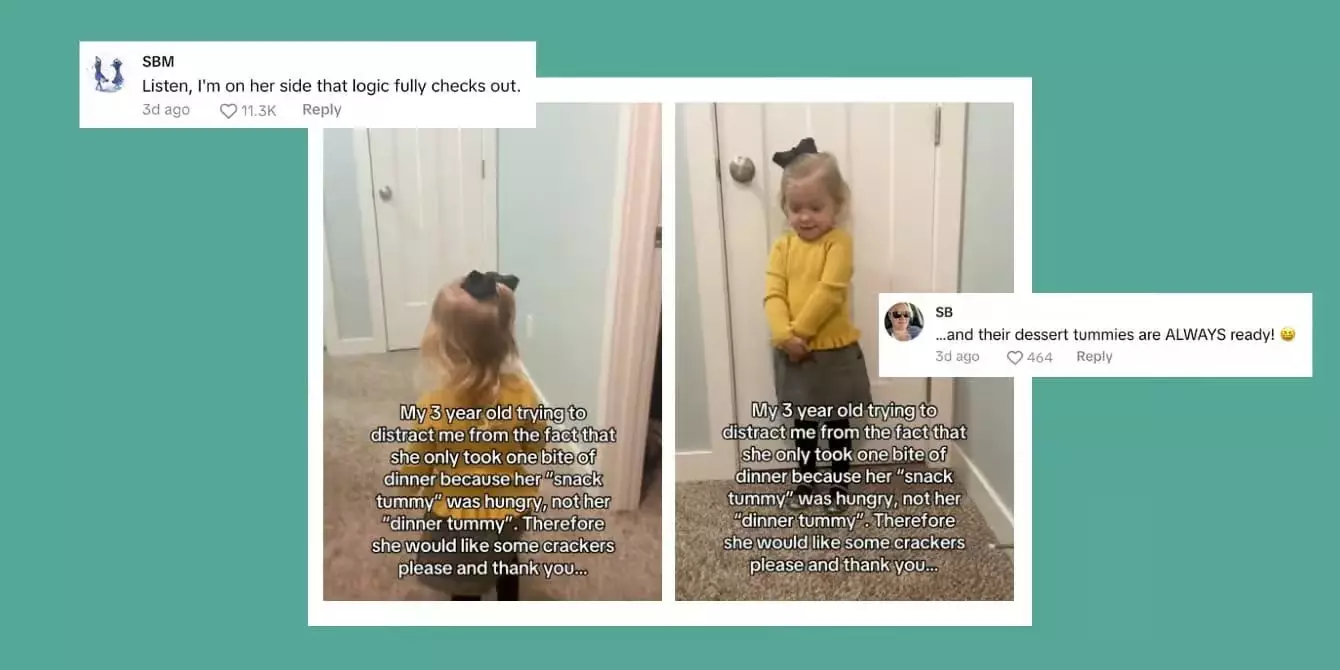As any parent can attest, there’s a delightful paradox that unfolds during mealtime with toddlers: the curious phenomenon known as the “snack tummy.” Imagine the scene: you’ve painstakingly prepared a nutritious dinner, only for your little one to declare, “I’m full.” Yet, moments later, they craftily request a snack as if they have some magical, separate compartment reserved solely for treats. This playful aspect of toddler eating behavior has been charmingly captured in a viral TikTok video featuring a delightful little girl who quips about her concept of different tummies. With over 2.2 million views, her candidness resonates with countless parents who have been through similar amusing escapades.
Such moments are not just entertaining; they tap into a universal experience that makes parenting both amusing and challenging. After all, who hasn’t been bewildered by a toddler saying they’re, “too full for dinner,” yet seem to develop a ravenous appetite for Goldfish crackers or sugary snacks just moments later?
A Journey through the Food Wars of Toddlers
Let’s dive deeper into the classic dinner table antics faced by parents everywhere. The battle begins with the beloved “Classic Rejection,” where a toddler dramatically proclaims themselves full after just three bites of their main course. Fast forward a few minutes, and we are greeted with the “Sudden Recovery,” where they suddenly find themselves starving for an entirely different dish—anything but the lovingly prepared meal.
Then we have the “Creative Justifications,” a category wherein creativity interacts with the absurdity of toddler logic. “That’s not dinner; it’s a snack,” they might insist, creating a baffling distinction that only they can comprehend. It’s almost like they possess a unique set of rules governing their culinary world. But therein lies the charm—the unpredictability of toddler dining logic evokes laughter, even amidst the frustration. As parents, we are not just bystanders; we are part of a whimsical food circus where toddlers are the headlining acts.
The Science Behind Snack Obsession
To understand why toddlers seem to have a perpetual hunger for snacks, we can turn to science, particularly concepts like intuitive eating and sensory-specific satiety. Intuitive eating, a principle endorsed by pediatric nutritionists, encourages children to listen to their own hunger cues to establish a healthy relationship with food. The danger arises when parents override those cues, often leading to unhealthy eating patterns down the line.
Then there’s sensory-specific satiety, which explains that kids might tire of the same meals quickly but can be easily reinvigorated by an enticing new snack. Picture this: your child might have turned their nose up at broccoli but suddenly finds it appealing when a cupcake is offered as a reward. Parents can leverage this phenomenon, creating an engaging and ever-changing menu that keeps toddlers interested and willing to try new foods.
Strategies to Navigate Mealtime Madness
So, how can parents maneuver through this delightful chaos? It all starts with embracing the quirks while maintaining some boundaries. The first step is to honor their hunger cues. If your toddler insists they are full, acknowledge that but with a strategic plan—for instance, serving smaller portions initially to make the meal less daunting.
Why not transform dinner into a fun, snack-like experience? Serving meals in a charcuterie-style format can make all the difference. Bite-sized options like cheese, fruit, and crackers elevate the dining experience and make it feel less like a chore and more like a treat, making the mealtime battle feel more like a fun adventure rather than a conflict.
Additionally, negotiable options with a twist can be beneficial. Foods that offer nutritional value while sounding indulgent are ideal. Examples include Greek yogurt adorned with fruits or banana slices slathered in peanut butter. This clever fusion of nutrition and delight can bridge the gap between what parents want and what toddlers will eat with glee.
Lastly, never underestimate the power of language and presentation. A simple word swap—calling every meal “lunch” instead of “dinner”—can make all the difference in your toddler’s appetite. Their perception is everything at this age, and we, as parents, are the master marketers of mealtime.
The Parenting Perspective
Ultimately, the whimsical logic of a toddler’s “snack tummy” offers more than moments of laughter; it serves as a lens into their self-expression and burgeoning personalities. Each declaration of sudden hunger for a cookie or avoidance of vegetables is an insight into their understanding of the world. So, the next time your child delights in their inventive mealtime reasoning, take a moment to appreciate the creativity. Parenting may be a series of challenges, but the humor found in these scenarios is what keeps us all grounded and enchanted through the journey. What hilarious mealtime excuse has your little one hit you with recently? The community of parents is eager to join in the laughter!

